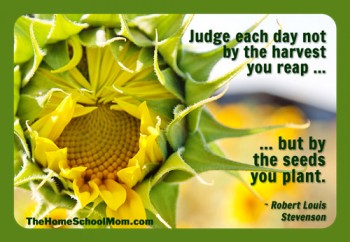
Blending Curriculum- and Community-Based Learning
by Liz Gardner
This post is contributed by Oak Meadow, the sponsor of our Living Education series.
"Judge each day not by the harvest you reap but by the seeds you plant." ~ Robert Louis Stevenson
Authentic Learning
For many families, homeschooling provides amazing opportunities to reflect on, reconsider, and restructure daily routines and rhythms around what matters the most. They find themselves opting out of the rush 'n go in favor of a slower-paced, more balanced, fully flavored schedule. Having more TIME is just one awesome by-product: time to slow down and do things your own way, with intention and purpose; time to establish routines that will nourish and nurture you, your children, and your family, your community, restore balance, and provide important flexibility; time to explore and follow your passions, get involved in community projects, try something new; to time to catch your breath, open yourself up to the possibilities and truly relish your time with your children.
Many families have made homeschooling central to their mission to simplify and live as sustainably as possible. This lifestyle can better prepare children to be resilient problem-solvers, compassionate community organizers, and self-sufficient, responsible global citizens.
These very ideals can inform the curriculum as well. Want to grow and raise more of your own food? Lessons in permaculture and agriculture, dendrology and botany can be framed in a hands-on, real-world context. Build a chicken coop, set up a rain barrel, design and plant a garden. Learn how to preserve your own food, prune your fruit trees, take care of farm animals, tap your trees and boil your own sap. Hook into the rhythms of the natural world, observe the seasons, and celebrate the subtle shifts each day brings.
Homeschooling families often spend time rediscovering some of the more practical Lost Arts: things that have been gobbled up by the rush 'n go culture and fallen out of favor in some schools and families, but still hold a firm place in the heart of our collective consciousness. These Lost Arts are incorporated into daily lessons and explorations, including writing letters and thank you notes by hand; practicing the art of cursive and calligraphy; making gifts and cards; knitting, sewing, and crocheting; upcycling projects that honor and close a more sustainable loop; building projects from start to finish, and other initiatives that involve imagining, designing, tinkering, fixing, problem-solving, taking things apart, rebuilding, working together, empathizing—all skills that will be essential for our children to have as they begin to face the challenges of this rapidly changing world.
Allowing your schedule to follow a more natural rhythm when homeschooling can enhance the overall experience as well. Being flexible can help minimize stress, prevent illness, and open up your world to new possibilities. Schedules can be rearranged to accommodate the need for more sleep, especially during times of illness or those changing circadian rhythms of adolescence. Daily walks, yoga sessions, bike rides, etc. can be incorporated into the day, along with all sorts of spontaneous, active fun. Taking advantage of opportunities as they arise enable families to work with and not against the natural flow of learning, and enjoy unexpected discoveries and joys. This is typically when the good stuff happens! The flexibility of homeschooling can open up the world classroom and ignite an enthusiasm and passion for learning.
This is an education fueled by curiosity and imagination and an enthusiasm for learning and zest for living, guided by the individual student's learning style, interests and passions, and shaped by the natural, organic flow of learning. At the center of the homeschooling experience is the curriculum, which can be brought to life, stretched and expanded, enriched and infused with real-world, expeditionary, project-based, community learning opportunities, outside resources and programs, and spontaneous, serendipitous adventure.
When my two sons and I were homeschooling, we organized town-wide Earth Day clean-ups every spring, which invited residents to come together to clean up the roadways, learn more about recycling, build community and enjoy some locally-produced ice cream. When we were studying Native History and Local History, we were able to work with townspeople and tribal elders to explore and preserve a sacred burial site in town that was being considered for development. We attended committee meetings, researched local native and colonial history, and volunteered to help with the geothermal survey that was done on the property, learning more about archaeology and the science of ground penetrating radar in the process.
When we were learning U.S. and World History within the context of family history, we spent hours on end happily researching, interviewing family members, reading old letters and journals, visiting ancestral haunts with grandparents, and unearthing some amazing stories, which we brought to life on our family history blog. When my sons helped out at my weekly two-hour Story Adventures and Summer Reading & Arts programs at the library, they assisted in planning, preparing, and leading the programs, helping me brainstorm ideas, choose books, songs, and hands-on projects, and read stories to the younger children.
Every fall, we spent long hours immersed in gearing up for the local Kids' Craft Fair, carefully choosing and working on their craft and food projects, figuring out pricing, signage, and display, practicing making change, and putting together artist cards and packaging. At the Fair itself, the boys enjoyed connecting with other homeschooling families, and learned critical marketing, economics, and people-skills. This type of learning experience offers deep, meaningful connections to community, family, and self, enabling a more authentic engagement that has a positive impact on the entire community.
"Education is not preparation for life; education is life itself." ~ John Dewey

Sustaining such a dynamic, wide-ranging home learning experience over a long period of time is possible simply because engaging educational adventures provide sustenance. They fill our hearts and souls as well as our heads. When this happens, homeschooling blossoms from basic academics into a lifetime of civic engagement and responsibility, stewardship and love of learning.
Liz Gardner is a former homeschooling mom, a blogger, a health advocate, and Oak Meadow's Director of Community Development and Social Media. Her four-year homeschooling journey with her two sons was lively, lovely, and tons of fun.



 Enjoy these posts from the pages of Living Education, the seasonal journal from our contributing sponsor,
Enjoy these posts from the pages of Living Education, the seasonal journal from our contributing sponsor,
Leave a Reply